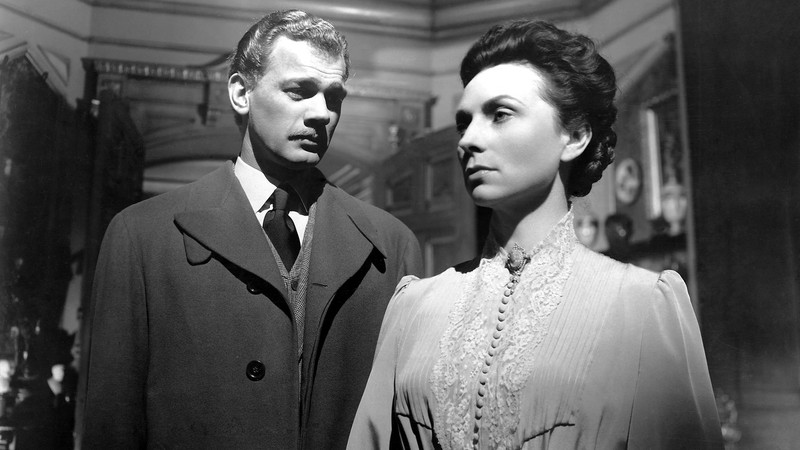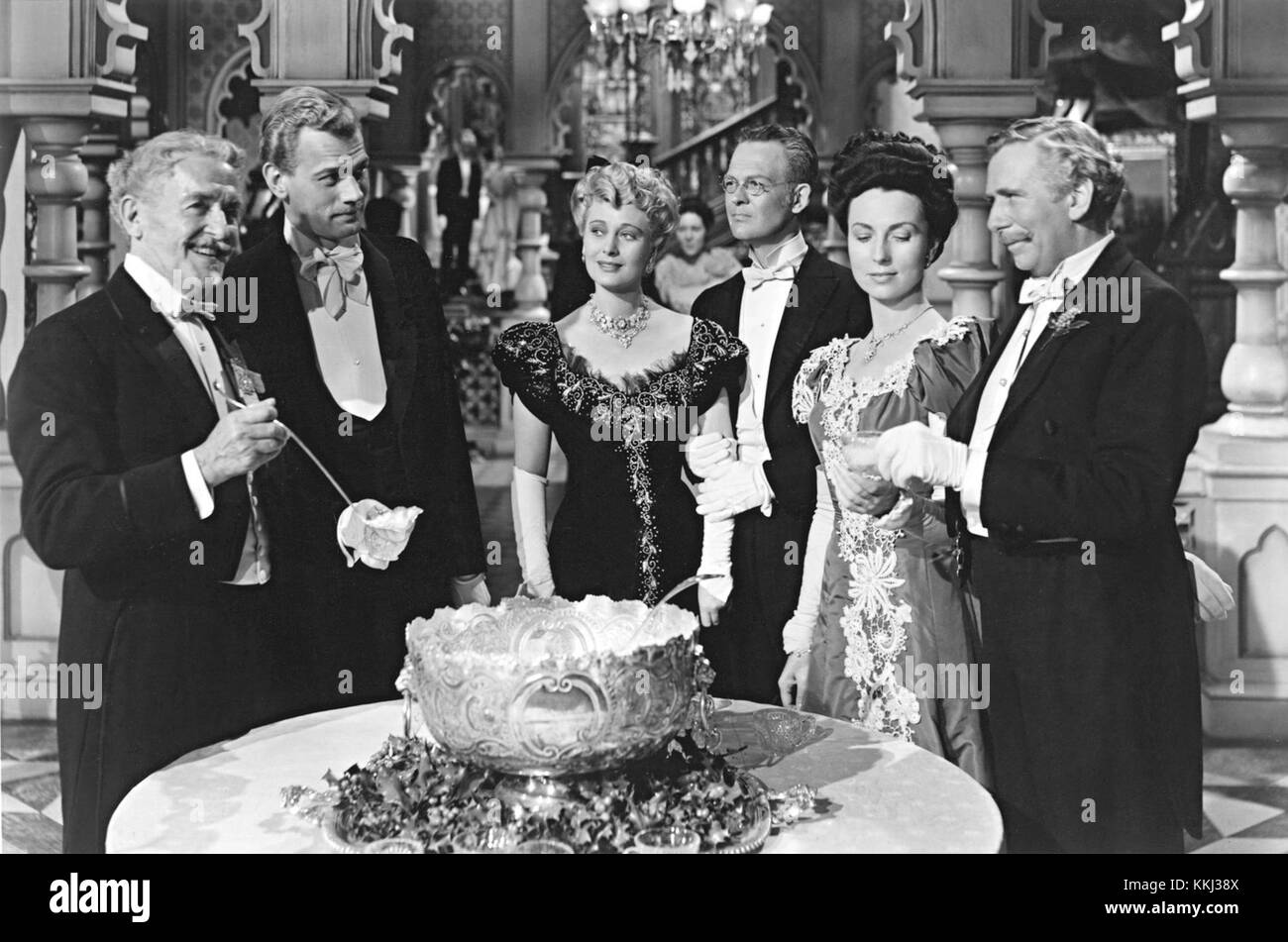← Back to Reviews
in
The Magnificent Ambersons
Orson Welles followed his triumphant instant classic Citizen Kane with a dark and riveting melodrama called The Magnificent Ambersons that took an up close look at class struggle and star-crossed love with the aid of some innovative storytelling techniques that were probably considered groundbreaking in 1942.

Welles is billed as co-director and co-screenwriter of this look at a wealthy family in a small town who are the fodder of gossip as their every move is scrutinized during this period of change in the world of transportation, where the country is in the process of going horseless, a concept many consider evil and the end of civilization as they know it. Eugene Morgan is a penniless man who is in love with Amberson matriarch Isabell, but is driven out of town through the machinations of Isabell's son George and her sister, Fanny. Morgan does return to town though, a big shot in the automotive industry but his attempts to reconnect with Isabell are still thwarted by George, who even puts his romance with Morgan's daughter, on the back burner in order to protect his mother.

The screenplay by Welles and Joseph Cotten (though Cotten doesn't get credit on screen) is based on a novel by Booth Tarkington that uses a couple of screen story techniques and puts a spin on them. Exposition for this story is effectively provided through Welles' narration and commentary from minor characters who initially gather in front of the Amberson mansion and then pop in off and on, offering insights into this important family and making it clear that the citizens of this town monitor every single thing that the Ambersons do, somewhat akin to the Kennedys. This is also the first film I've seen where the closing credits are done on the audio by the director.

Once the lay of the cinematic land has been set up for us, we get a voyeuristic look at some family dynamics that do have a familiar flavor, though there is a flavor of distaste to what we're watching that makes us think we're definitely missing, the same darkness that Welles provided to Citizen Kane. George's obsession with keeping his mother away from Morgan was creepy and incomprehensible. The truly bold cinephile might find an incestuous component to the relationship between George and his mother, but nothing overt. It was something akin to the alleged gay relationship that Hitchcock implies between John Dall and Farley Granger in Rope.

According to the IMDB, four minutes were cut out of the original print of this film, but it sure felt like more than that to me because a lot of the transitions from scene to scene seemed very abrupt but didn't deter a but from Welles' atmospheric direction. Joseph Cotten lights up the screen as Eugene and Dolores Costello is luminous as Isabell. She would only make one more film after this one. Tim Holt was a little one-note in the pivotal role of George but Anne Baxter sparkles as Lucy Morgan and Agnes Moorhead almost steals the movie as Aunt fanny, a performance that earned her an Oscar nomination for Best Supporting Actress. The film received three other nominations, including Best Picture. It's not as good as Citizen Kane, but this one has Welles' creative hand all over it.
Orson Welles followed his triumphant instant classic Citizen Kane with a dark and riveting melodrama called The Magnificent Ambersons that took an up close look at class struggle and star-crossed love with the aid of some innovative storytelling techniques that were probably considered groundbreaking in 1942.

Welles is billed as co-director and co-screenwriter of this look at a wealthy family in a small town who are the fodder of gossip as their every move is scrutinized during this period of change in the world of transportation, where the country is in the process of going horseless, a concept many consider evil and the end of civilization as they know it. Eugene Morgan is a penniless man who is in love with Amberson matriarch Isabell, but is driven out of town through the machinations of Isabell's son George and her sister, Fanny. Morgan does return to town though, a big shot in the automotive industry but his attempts to reconnect with Isabell are still thwarted by George, who even puts his romance with Morgan's daughter, on the back burner in order to protect his mother.

The screenplay by Welles and Joseph Cotten (though Cotten doesn't get credit on screen) is based on a novel by Booth Tarkington that uses a couple of screen story techniques and puts a spin on them. Exposition for this story is effectively provided through Welles' narration and commentary from minor characters who initially gather in front of the Amberson mansion and then pop in off and on, offering insights into this important family and making it clear that the citizens of this town monitor every single thing that the Ambersons do, somewhat akin to the Kennedys. This is also the first film I've seen where the closing credits are done on the audio by the director.

Once the lay of the cinematic land has been set up for us, we get a voyeuristic look at some family dynamics that do have a familiar flavor, though there is a flavor of distaste to what we're watching that makes us think we're definitely missing, the same darkness that Welles provided to Citizen Kane. George's obsession with keeping his mother away from Morgan was creepy and incomprehensible. The truly bold cinephile might find an incestuous component to the relationship between George and his mother, but nothing overt. It was something akin to the alleged gay relationship that Hitchcock implies between John Dall and Farley Granger in Rope.

According to the IMDB, four minutes were cut out of the original print of this film, but it sure felt like more than that to me because a lot of the transitions from scene to scene seemed very abrupt but didn't deter a but from Welles' atmospheric direction. Joseph Cotten lights up the screen as Eugene and Dolores Costello is luminous as Isabell. She would only make one more film after this one. Tim Holt was a little one-note in the pivotal role of George but Anne Baxter sparkles as Lucy Morgan and Agnes Moorhead almost steals the movie as Aunt fanny, a performance that earned her an Oscar nomination for Best Supporting Actress. The film received three other nominations, including Best Picture. It's not as good as Citizen Kane, but this one has Welles' creative hand all over it.
